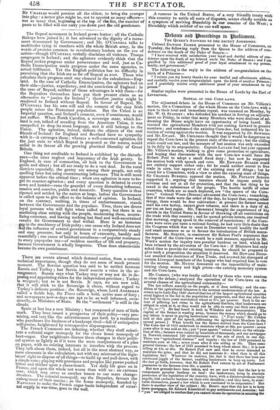The Repeal movement in Ireland grows hotter: all the Catholic
Bishops have joined it ; it has advanced to the dignity of a move- ment denounced by Government ; and Mr. O'CONNELL talks to multitudes vying in numbers with the whole British army, in the words of promise common to revolutionary leaders on the eve of action—though O'CosavELL verbally disclaims all violence. Troops congregate in Ireland; and the agitators evidently think that the Repeal makes progress under perseverance and zeal, just as Ca- tholic Emancipation made progress under the same agencies, to actual fulfilment. Yet the English politician has no difficulty in perceiving that the Irish are as far of Repeal as ever. Those who calculate their progress omit one element in the calculation—Eng- land. In the case of Catholic Emancipation, the agitators had on their side—justice, expediency, and the conviction of England : in the case of Repeal, neither of those advantages is with them—for the Repealers themselves have put their present claim as an alternative to "justice for Ireland" ; therefore justice might be rendered to Ireland without Repeal. In favour of Repeal, Mr. O'CONNELL has his own will and the consent of the easy Irish people minus the Protestant population. But the Union is an Imperial question, and Ireland's consent, even if unanimous, would not suffice. When North Carolina, a sovereign state, which Ire- land is not, talked of seceding from the American Union, it was compelled to drop its stout language, and it still belongs to the Union. The agitation, indeed, defeats the objects of the real friends of Ireland : for England and Scotland have no sympathy with it—it estranges them ; whereas a well-concerted agitation, for the just ends to which Repeal is proposed as the means, would enlist in its favour all the growing practical liberality of Great Britain.
One thing not creditable to Ireland is exhibited by the disturb- ance—the utter neglect and impotency of the Irish gentry. In England, in case of commotion, all look to the Government to guide and direct ; but all are ready to do a vast deal. In the rural districts especially, the gentry are among their people, not only quelling force but using counteracting influences. This is still more apparent before the critical time ; when one agitation is sure to be- get its counter-agitation ; and every question is debated in every town and hamlet—runs the gauntlet of every disturbing. influence, suasive and coercive, public and domestic. Every question is thus ripened and settled by the nation at large, before the Government is called upon to give effect to the balance of opinion. In Ireland, on the contrary, nothing, in times of embarrassment, stands between the Government and the populace. True, there are divers loyal persons who will fight when called upon ; but there is no mediating class mixing with the people, moderating them, neutra- lizing extremes, and leaving nothing but final and well-ascertained results for Government to deal withal. Here is an immense gap in the machinery of Irish polity; one cause why Ireland does not fed the influence of central government in a comparatively steady and easy pressure, but only in hours of extremity, harshly and resentfully ; one cause of habitual unruliness—of popular resistance to every unpopular tax—of reckless sacrifice of life and property, because Government is wholly forgotten. Thus does absenteeism become its own punishment.


























 Previous page
Previous page